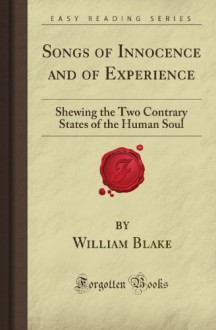Songs Of Innocence And Of Experience: Shewing The Two Contrary States Of The Human Soul (Forgotten Books)
Songs of Innocence and of Experience: Shewing the Two Contrary States of the Human Soul are two books of poetry by the English poet and painter, William Blake. Although Songs of Innocence was first published by itself in 1789, it is believed that Songs of Experience has always been published in...
show more
Songs of Innocence and of Experience: Shewing the Two Contrary States of the Human Soul are two books of poetry by the English poet and painter, William Blake. Although Songs of Innocence was first published by itself in 1789, it is believed that Songs of Experience has always been published in conjunction with Innocence since its completion in 1794.Songs of Innocence mainly consists of poems describing the innocence and joy of the natural world, advocating free love and a closer relationship with God, and most famously including Blake's poem The Lamb. Its poems have a generally light, upbeat and pastoral feel and are typically written from the perspective of children or written about them.Directly contrasting this, Songs of Experience instead deals with the loss of innocence after exposure to the material world and all of its mortal sin during adult life, including works such as The Tyger. Poems here are darker, concentrating on more political and serious themes. Throughout both books, many poems fall into pairs, so that a similar situation or theme can be seen in both Innocence and Experience. (Quote from wikipedia.org)About the AuthorBlake, William (1757 - 1827)William Blake (28 November 1757 - 12 August 1827) was an English poet, painter, and printmaker. Largely unrecognized during his lifetime, Blake's work is today considered seminal and significant in the history of both poetry and the visual arts.Blake's prophetic poetry has been said to form "what is in proportion to its merits the least read body of poetry in the language."His visual artistry has led one modern critic to proclaim him "far and away the greatest artist Britain has ever produced."Although he only once traveled any farther than a day's walk outside L
show less






 11 years ago
11 years ago